Start studying IIVI6/4V7I chord progression Learn vocabulary, terms, and more with flashcards, games, and other study toolsThe 8bar blues progression is similar to the much more popular 12bar traditional blues progression except that bars 3, 4, 8 and 10 are eliminated in order to shorten the sequence The turnaround continues to be comprised of the last two bars of the progression with many possible substitutions availableProgression # 11 I iii IV V 1 GAm Bm C ¤¤¤¤ ¤¤¤¤ ¤¤¤¤ ¤¤¤¤ Progression # 12 I ii iii IV GABm C 1 ¤¤¤¤ G ¤¤¤¤¤¤¤¤ C ¤¤¤¤¤¤¤¤ G ¤¤¤¤ D7 ¤¤¤¤ G ¤¤¤¤ Progression # 13 I IV I V7 I 1 G F 5 G D ¤¤¤¤ ¤¤¤¤ ¤¤¤¤ ¤¤¤¤ ¤¤¤¤ ¤¤¤¤ ¤¤¤¤ ¤¤¤¤ Progression # 14

Discovering Minor Chord Progressions Musical U
I iv v7 chord progression piano
I iv v7 chord progression piano-Also, all these progressions can be compressed or stretched in duration For instance progression 8) "May the Long Time Sun" is the same progression as 9) "California Stars" In "California Stars", each chord is sustained for 2 measures instead of 1, so the progression cycles over 8 measures instead of 4Also, all these progressions can be compressed or stretched in duration For instance progression 8) "May the Long Time Sun" is the same progression as 9) "California Stars" In "California Stars", each chord is sustained for 2 measures instead of 1, so the progression cycles over 8 measures instead of 4



How To Play The I Iv V V7 I Major Chord Progressions In All Keys And All Inversions By Jerald Simon Music Theory Music Teaching Resources Music Motivation
"I IV V V7 I" Chord Progression in every key (moving up chromatically in half steps) page 2C sounds peaceful, more serenePractice playing the IIVVV7I Chord progression in C and play around with the chords You can purchase my book, Essential Piano Exercises to learn this chord progression in all keys Have fun improvising and creating music of your own that you can share with others!
In music, a "progression" happens when one chord changes to another chord For example, many pieces of music begin with notes that are taken from chord I (the tonic chord), followed by notes from chord V (the dominant chord) Here is the beginning of the famous theme from Dvorak's "New World Symphony", which begins with a IV progressionPlaying the iiviV7i Chord Progression in Major Keys (p 53) Ask students to play the chord progression in two minor keys 5 Harmonization with primary chords Give the students 5–7 minutes to study and harmonize an example of the teacher's choice Play using an appropriateE Major Scale and Chord Progression IIVIV7I Worksheet E minor major 9 guitar chord GtrLib Chords E major ukulele chord UkeLib Chords E Major Scale Guitar Ultimate Guide Guitar Lessons Blog
Chord Progression in F# Minorr ii7ivii65i64V7i by Ausra MotuzaitePinkeviciene, DMAIf you like my music making, you can support me on Patreon and getCopyright © 10 by Music Motivation® International Copyright Secured All rights reserved visit wwwmusicmotivationblogcom, wwwmusicmotivationcom, and wwwPlay D Major IIVIV7I chord progression Demonstrate knowledge of reading and playing eighth (8th) notes Choose and play a piece by ear Play the required repertoire with proper fingering, notes, rhythm and musicality Define given music terms and demonstrate knowledge of the associated music theory



Minor Chord Progressions Write Deeply Emotional Music Musician On A Mission



Chord Progressions Minor I V7 I Theory Ear Training Piano Ology
A chord progression is the order chords are played, one after another, in a song or a piece of music The chords you use, and the order you play them in make up the harmony of a song Like most of music, chords and their progressions come in patterns A chord progression is just that – the pattern of chords in songs you play or writeCopyright © 10 by Music Motivation® International Copyright Secured All rights reserved visit wwwmusicmotivationblogcom, wwwmusicmotivationcom, and wwwC sounds peaceful, more serene
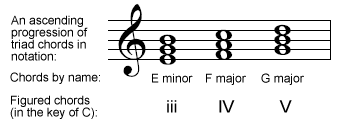


Chord Progression Wikipedia



Chord Progressions Major I V7 I Theory Ear Training Piano Ology
Now note that this II V7 I chord progression is easily identified by looking at the two chords above the key chord In the Key of C, move up two to a "D" and then down one to the "G" and then back to the "C" It's that way for all of the keys One additional point, you may recognize this progression as one that is used at the end of a songAnother smooth chord progression example is the song "Happy" by Pharrell Williams This chord is in the key of F major Dbmaj7 – Cm7 – Cm7 – F bVImaj7 – Vm7 – Vm7 – I As you can see, instead of using the diatonic V7 chord, he is using a Vm7 borrowed chord to make the chord progression more smoothChord with the 3rd added to the bottom of the chord The top notes of the "II" chord are the same as the "IV" chord Using the "IIVI" progression makes use of the strong root movement of the 5th (see circle of 5ths) Minor Chord Progression Shown using 4 part chords as well, but this time in the Minor key of "C Minor"



I Iv I V I Chord Progression All Major Keys Youtube
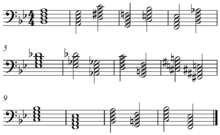


List Of Chord Progressions Wikipedia
The I, IV, and V chords appear all over the fretboard The better you learn your keys, chord patterns, and the notes of the fretboard, the more access you'll have to finding each key's I, IV, and V, and the more you'll be able to do with themChord Progressions Using Two or Three Chords IIV IV IIVV IIIIV IIVV7 (The V7 is a Dominant 7th chord These will be explained in a future lesson) I – bVIIIV (The VII is flattened) IbIIIIV (The III is flattened) Chord Progressions Using Four Chords IIVIV IIVIV7 IIVVIV IviIVV IviiiV IVviIV IVIIVV IIThis chord progression will sound fine, but since there are no common tones between the chords, it won't sound very smooth Knowing what we do about chord inversions and extensions, let's rearrange these chords to fix that Let's start by keeping the C Major triad in its root position
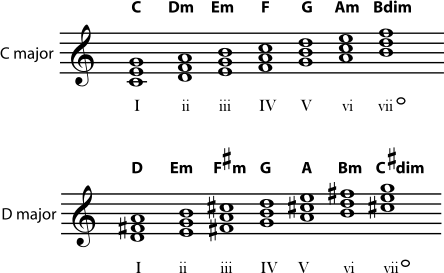


5 5 Beginning Harmonic Analysis



Free Midi Chord Pack 50 Famous Edm Chord Progressions
Chord Progression 1 So, the first progression to learn is a I – iV – V7 (the 7th is optional on this one) V7 to I is a popular cadence or a harmonic pattern that creates a sense of resolution Basic chord building states the use of every other tone in a scale to build your chord The most basic chord is a triad, or three tone chordThis is a piano sheet for exercises of the chord progression (cadence) I IV I V V7 I, starting from the roof position of tonic ("I" or "one") chord in all 12 different major keys IVchord, Vchord, and V7chord are inverted Even though there are key signatures at the beginning of each line (system), we provided cautionary sharpsNeapolitan progressions deserve a shoutout here;
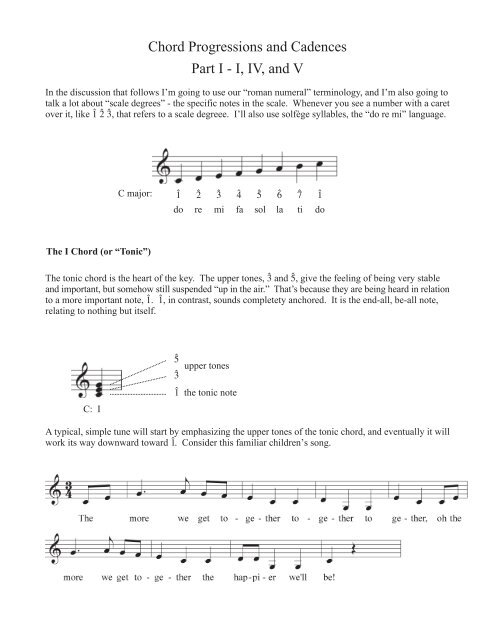


Chord Progressions And Cadences Part I I Iv And V Dave Smey



Park Arts Harmonizing A Melody
The "Primary" Chords in music are the three most commonly used chords the I, IV, and V (or V7) chords These chords are built on the first, fourth, and fifth degrees of a diatonic scale DIATONIC SCALE DEGREE NAMESI IV I V V7 I starting from the root position of tonic ("I" or "one") chord in 12 Major keys This is a piano sheet for exercises of the chord progression (cadence) I IV I V V7 I, starting from the roof position of tonic ("I" or "one") chord in all 12 different major keys IVchord, Vchord, and V7chord are invertedI bII 6/3 i 6/4 V7 I which in C Minor would translate to Cm Db/F Cm/G G7 Cm Also might be worth mentioning Picardy thirds, which sound suitably old Basically take a minor progression which lands on your tonic chord (i) as the last chord of the piece, and make it major (I)



Piano Chord Progressions Ii V I In Common Major Keys Music Stand Chord Charts Book 7 Kindle Edition By English Diana Arts Photography Kindle Ebooks Amazon Com



Free Piano Exercise I Iv I V V7 Progression In Major Keys
This bundled resource is great for every Piano 1 class With each indicated key (10 total), you receive the scale in treble and bass clef, correct fingerings for the scale, the chord progression IIVIV7I in each key, and the fingerings for the chords This resource includes the following 10 keE Major Scale and Chord Progression IIVIV7I Worksheet E minor major 9 guitar chord GtrLib Chords E major ukulele chord UkeLib Chords E Major Scale Guitar Ultimate Guide Guitar Lessons BlogPractice playing the IIVVV7I Chord progression in C and play around with the chords You can purchase my book, Essential Piano Exercises to learn this chord progression in all keys Have fun improvising and creating music of your own that you can share with others!
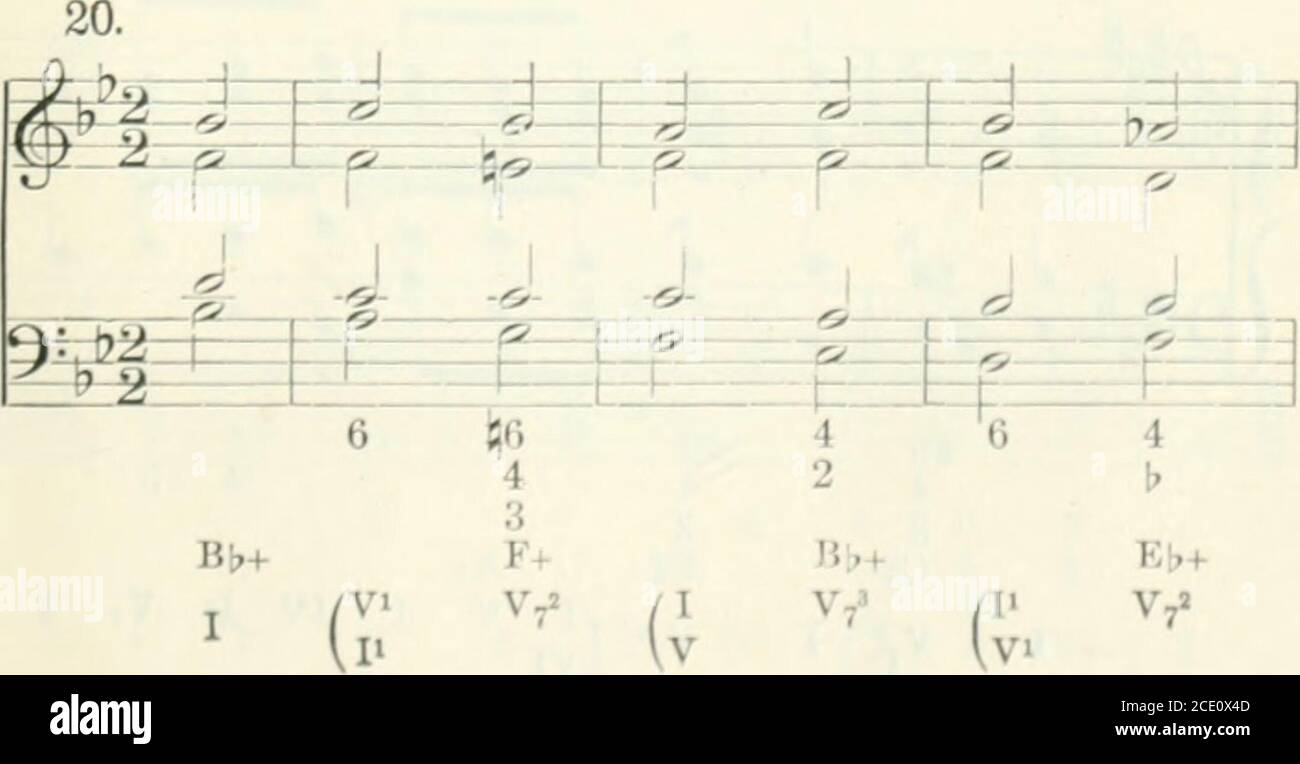


A Treatise On Harmony With Exercises Iii 1 1 Tii 7 I57 I


Aldwell Schachter Chapter 7
V is the most closely related chord to I, so it is in next spot to the left IV is a little more distantly related, so it goes further out in the chain We often see the progression IVVI The "plagal progression" is a slightly more unusual step out of the chain It's not as basic or keydefining as IVICommon chord progressions in the key of D major are as follows I – IV – V (D – G A) I – vi – IV – V (D – Bm – G – A) ii – V – I (Em7 – – Dmaj7) Here's a diagram of the D major key signature as well as the notes of the D major scale on the treble and bass clefs The D major scale has two sharpsHere's a challenge Think list as many songs you know that have the I vi IV V7 (C Am F G7) chord progression in any part of the song I will make an exception The IV chord can be substituted with ii7, and the V7 chord can be substituted with V A Teenager in Love Doc Pomus, Mort Human



What Is It About The Blues Chord Progression That Makes The Blues Feel Music Practice Theory Stack Exchange



The Basics Of Voicing I Iv V7 Progression On Piano Student Question Youtube
In the key of C major, this progression becomes C–Am–F–G In the key of F it would be F–Dm–Bâ™–C, and so on Sometimes the last chord would be a dominant 7 th, eg, G7 in the key of C In early Rock 'n' Roll it was generally written either in 6/8, 12/8, or in 4/4 with triplets See Pic 1 and Pic 2In Silent Night the chord progression would be I, V7, I, IV, I, IV, I, V7 I, V7, I We could go through song after song like that, and what you would find is that the most used chord is the I chord, followed by the V7 chord, and followed by the IV chord Plus most songs start and end on the I chordFor each key, there are 3 chords that are played more than others known as "primary chords" The I IV V chords are built from the 1st, 4th and 5th note of a scale Let's take the key of C again as an example, looking at the illustration above, you will notice that note I on the key of C is C, note IV is F and note V is G



What Does A Chord Chord Mean Like V V Or Something Music Practice Theory Stack Exchange



Greg Howlett The Ii V7 I Progression And V7 To Ii7 Chord Substitution
But he did tell me the simple chord progression was a I to V7 progression If you're not familiar with chord progressions or notating them with roman numerals, let me explain I prefer to use the key of C Major as an example because of the sheer simplicity of it So if we're in the key of C Major, our I (Roman numeral 1) chord of course isExamples A, B & C above are basically the same traditional progression I IV I V7 I But the substitute chords in each example give a distinct, unique sound to each A is your basic "piano lesson" cadence (chord progression) B sounds tense, more dissonant;The IIVV Progression Whereas the IviIVV7 Rock Ballad (DooWop) Progression substituted the harder sounding "IV" chord for the softer "ii" chord of the IviiiV7 Standard Changes, the Rock Progression also omitted the softer sounding "vi" chord to create an even harder rock sound Examples of the classic IIVV Rock Progression include La Bamba verse (1959), Time Is On My
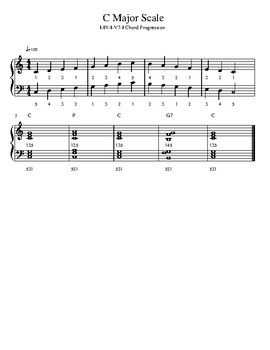


Major Scales And I Iv I V7 I Chord Progressions Piano 1 Tpt
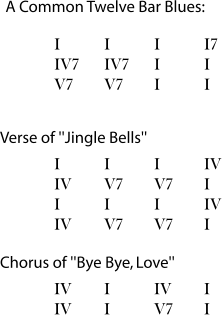


5 5 Beginning Harmonic Analysis
Chord Progression 1 So, the first progression to learn is a I – iV – V7 (the 7th is optional on this one) V7 to I is a popular cadence or a harmonic pattern that creates a sense of resolution Basic chord building states the use of every other tone in a scale to build your chord The most basic chord is a triad, or three tone chordMy teacher thought that progression was more important and that the ii > V > I was a truncated version of it You can see it is just a truncated circle Ultimately western harmony favors the V7 > I Since the ii chord is the V of the V chord the movement is more conducive to creating a cadence to the VThe chords in a progression have different harmonic functions Some chords provide the stability, some the departure, and some provide the dynamic tension Roman numerals are used to indicate the chords in a progression The numerals are based on the scale pattern of the diatonic scale For example, in the key of C major a I, IV, V7 (one, four



How To Play A I Iv V V7 I Chord Progression On The Piano And Improvise With It By Jerald Simon Youtube


Is There An Infinite Number Of Chord Progressions On The Piano Quora
Download a free pdf file with the progressions including chord diagrams I IV V7 progression with substitutions The progressions must not include ordinary major and dominant 7th chords The chords in it can be substituted in many ways Some examples of this C Fmaj7 G9 E Amaj7 Amaj7 Dmaj9 E13 D Dsus4 C F G Csus4 D7Smooth voice leading as little movement as possible between chords In the case of C Major in the progression you provided (right hand only) G A G G G E F E F E C C C B C The bass, should stay on the roots of those chords (in the right hand) C F G G C respectively Do this same basic thing, transposed to all your prescribed keys, andAfter all, your chord progression doesn't have a single "I" chord in it The obvious place for your (still assuming original key of C) to resolve to is a Dm chord, since dominant 7th chords "normally" resolve up a 4th But that still won't tell us for sure what key your new chord progression is actually in



Iv Vii Iii Vi Ii V I Chord Progression Workout Learn Jazz Standards



Listening For Ii V I Chord Progressions Musical U
In music, a "progression" happens when one chord changes to another chord For example, many pieces of music begin with notes that are taken from chord I (the tonic chord), followed by notes from chord V (the dominant chord) Here is the beginning of the famous theme from Dvorak's "New World Symphony", which begins with a IV progressionExamples A, B & C above are basically the same traditional progression I IV I V7 I But the substitute chords in each example give a distinct, unique sound to each A is your basic "piano lesson" cadence (chord progression) B sounds tense, more dissonant;



Piano Chord Progressions I Vi Iv V In Common Major Keys Music Stand Chord Charts Book 6 Kindle Edition By English Diana Arts Photography Kindle Ebooks Amazon Com
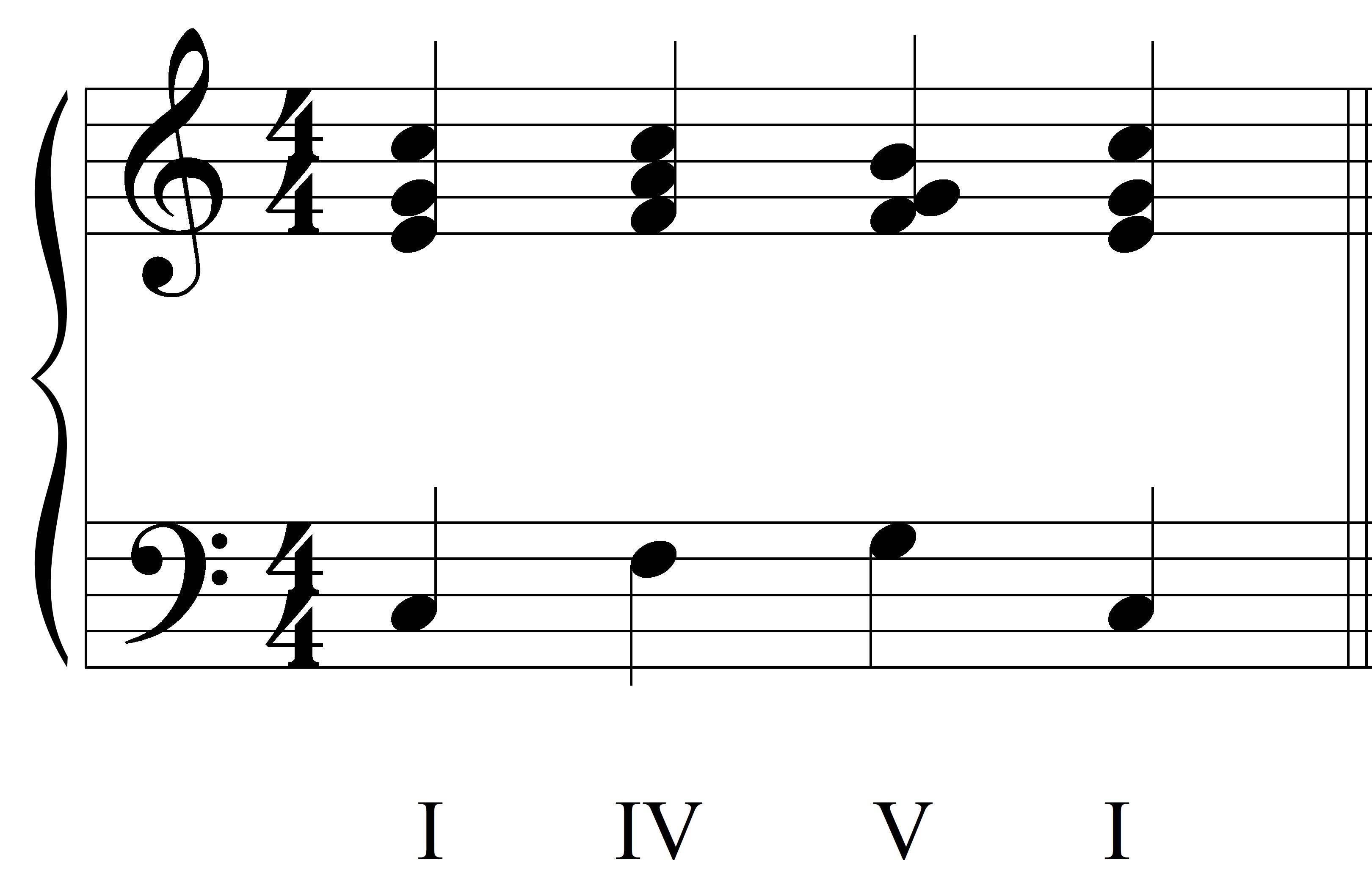


Integrated Aural Skills Score Study And Piano Practice More On Secondary Dominants



Greg Howlett The Ii V7 I Progression And V7 To Ii7 Chord Substitution


Lesson 97 I Iv I64 V African Folk Progression Quicklessons Piano Course



Primary Chords Chord Progressions I Iv V7 I Chords



Chord Progressions Writing Hit Songs Made Easy


Voice Leading For Guitar Berklee Online Take Note



Ii7 V7 I7 Progression



I Iv V7 I Progression G Major Chord By Chord Acoustic Guitar


Lesson 101 Iv Vii I R B Progression 2 Quicklessons Piano Course



Vi Ii V I Wikipedia
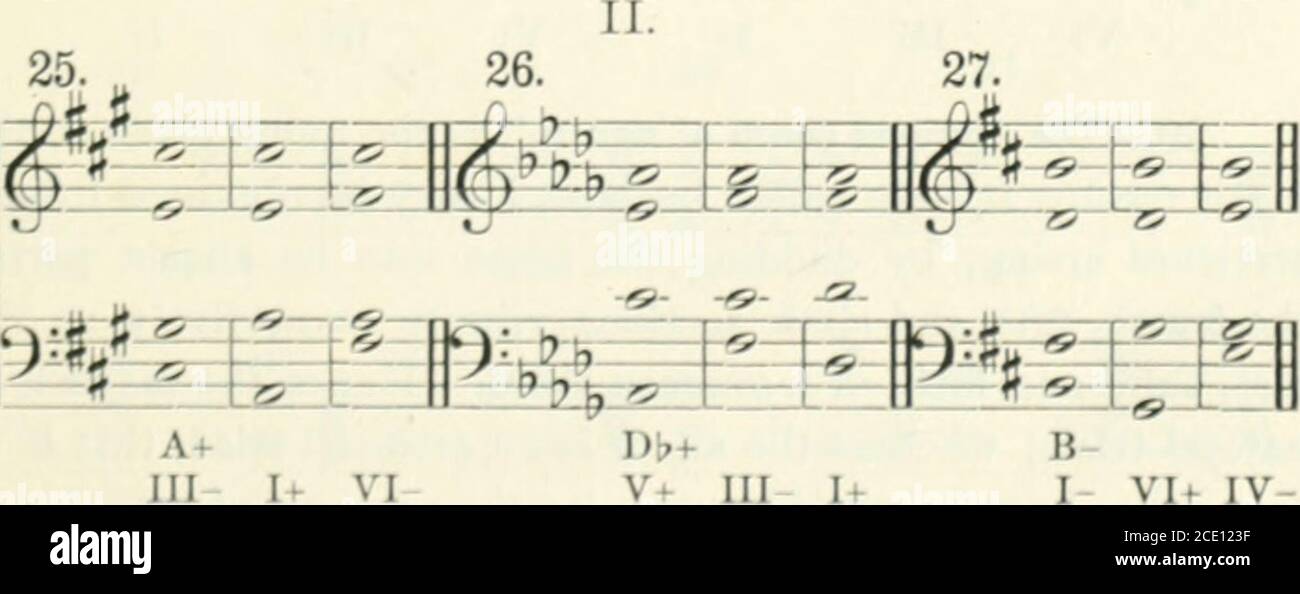


A Treatise On Harmony With Exercises 16 The Common Chord 19 A Mw I F5 Gt 1 2 A Js G Gt I Ri D2 Hjfe 6 A M 9i



Chord Progression In F Major I Vi Iv Ii Ii6 I64 V V7 I Youtube
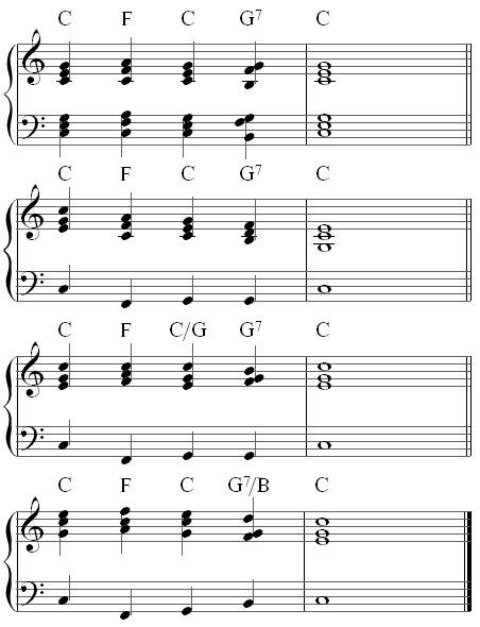


Primary Chords Chord Progressions I Iv V7 I Chords



Ii7 V7 I7 Progression



Mastering Essential Chord Progressions The I To Iv Relationship Jazzadvice



Free Pdf Of The I Iv V7 Cadences In Every Key Jenniferpinsmusic Com Piano Teaching Piano Music Teaching Music
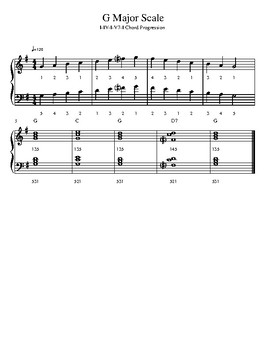


Major Scales And I Iv I V7 I Chord Progressions Piano 1 Tpt



What Is It About The Blues Chord Progression That Makes The Blues Feel Music Practice Theory Stack Exchange



Mastering Essential Chord Progressions The I To Iv Relationship Jazzadvice



I Iv V And I Iv V7 Progressions In All Keys



Ways To Play 2 5 1 Chord Progressions



I Iv V7 I Progression G Major Chord By Chord Youtube



How To Play A I Iv V V7 I Chord Progression On The Piano By Jerald Simon Music Motivation Visit Musicmotivatio Jazz Piano Basic Guitar Lessons Piano Chords



List Of Chord Progressions Wikiwand



How To Master The Backdoor Jazz Chord Progression Learn Jazz Standards



Keyboard Harmony Exercise I V6 I Iv6 I64 V V7 I G Major And E Minor Youtube


Jazz Chord Progressions Intro Lesson For All Guitarists
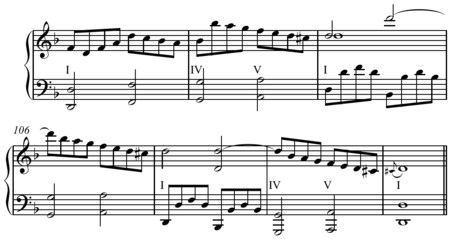


I Iv V I Wikipedia
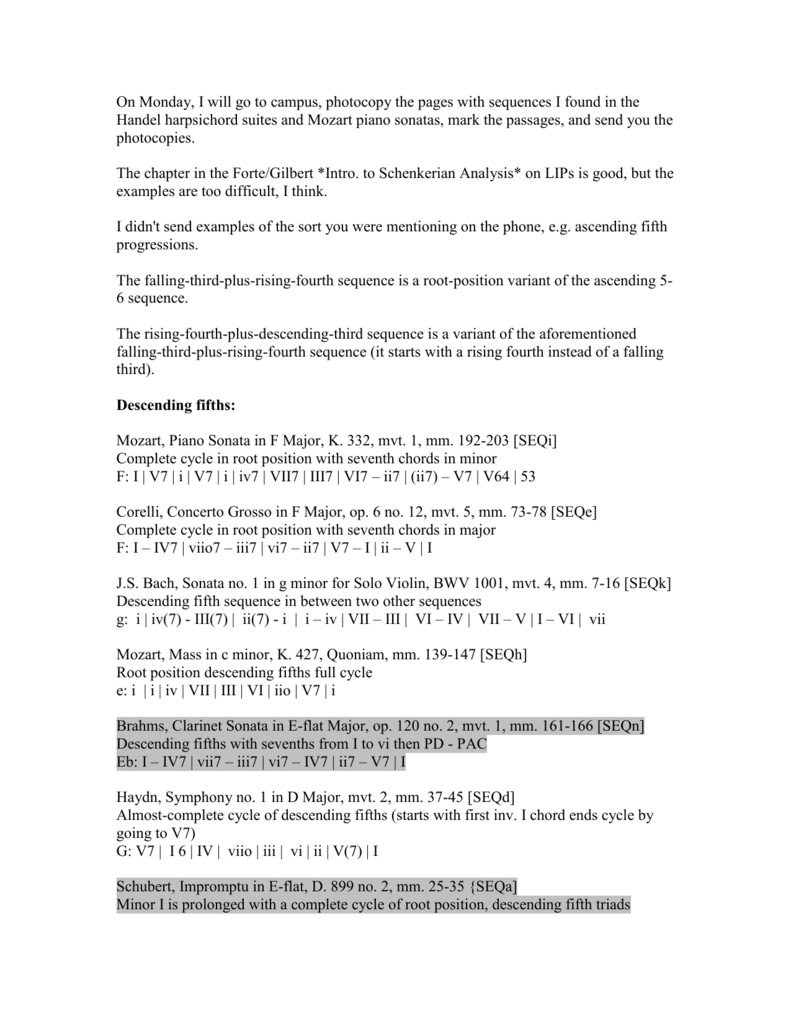


Notes Andre Mount



A Chord Progression Of I Iii Iv V7 In C Major Learn Music Music Theory Piano Chords



Disney Music Theory Blog



Free Midi Chord Pack 50 Famous Edm Chord Progressions



Ii V I Progression Wikipedia
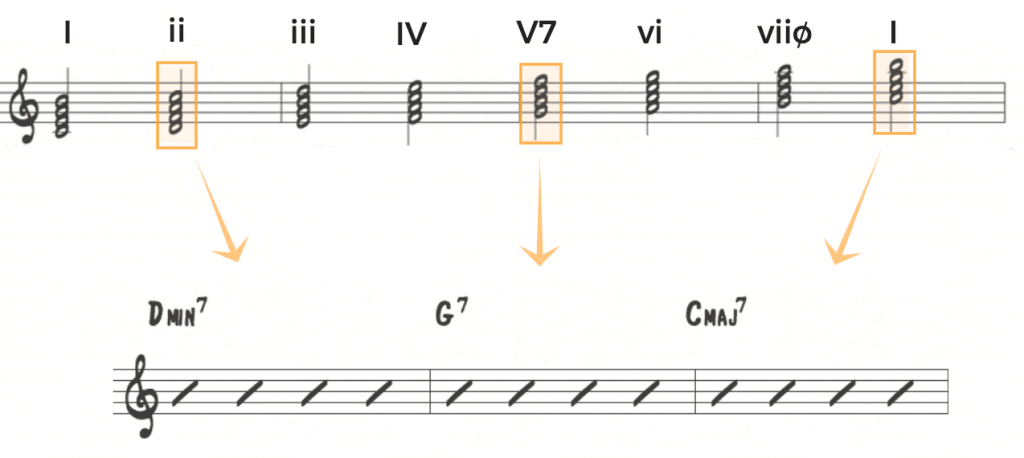


How To Master The Ii V I Progression 25 Essential Jazz Lines Jazzadvice



Video Lesson How To Unlock I Iv V Chord Progressions Acoustic Guitar



I Vi Iv V7 I Progression In G Major Chord By Chord Youtube


Voice Leading For Guitar Berklee Online Take Note
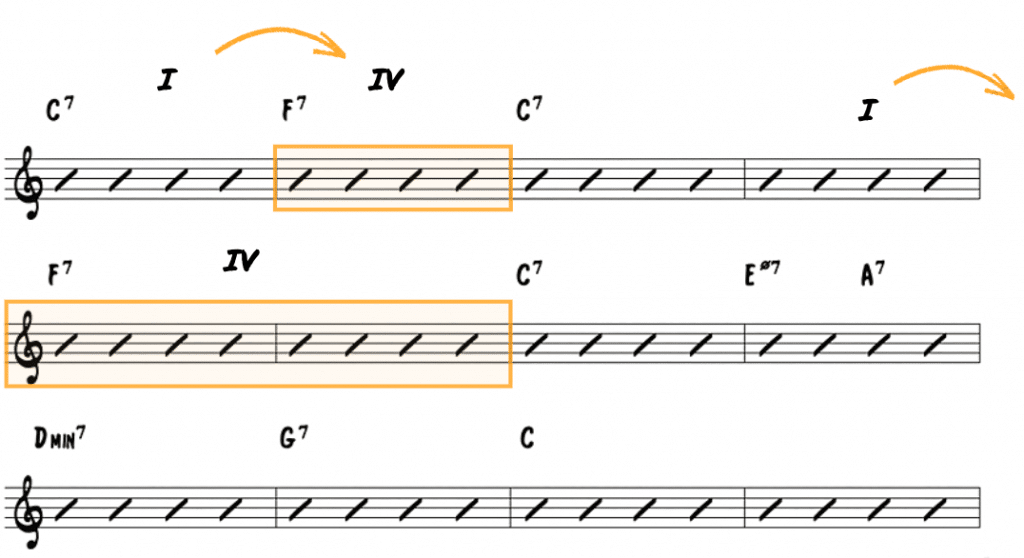


Mastering Essential Chord Progressions The I To Iv Relationship Jazzadvice



Chord Progressions Major I V7 I Theory Ear Training Piano Ology



Chord Progressions Guitar Lesson World



List Of Chord Progressions Wikipedia



Video Lesson How To Unlock I Iv V Chord Progressions Acoustic Guitar



How To Play The I Iv V V7 I Major Chord Progressions In All Keys And All Inversions By Jerald Simon Music Theory Music Teaching Resources Music Motivation
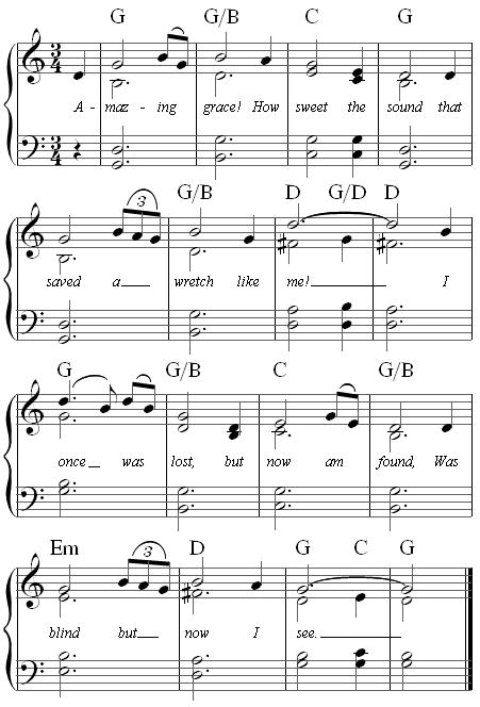


Primary Chords Chord Progressions I Iv V7 I Chords
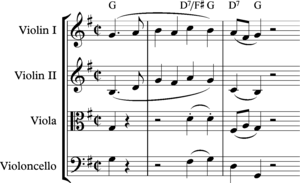


Chord Substitution Wikipedia



The 10 Most Used Chord Progressions In Pop And Rock And Roll Thinking In Music
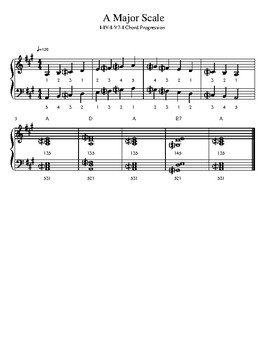


Major Scales And I Iv I V7 I Chord Progressions Piano 1 Tpt



Discovering Minor Chord Progressions Musical U



Ways To Play 2 5 1 Chord Progressions



Ii7 V7 I7 Progression


Voice Leading For Guitar Berklee Online Take Note



Mastering Essential Chord Progressions The I To Iv Relationship Jazzadvice



The 14 Most Popular Chord Progressions In Jazz



Chord Progressions Minor I V7 I Theory Ear Training Piano Ology



Chord Progressions Major I V7 I Theory Ear Training Piano Ology



Piano Chord Progressions I Vi Iv V In Common Major Keys Music Stand Chord Charts Book 6 Kindle Edition By English Diana Arts Photography Kindle Ebooks Amazon Com


Voice Leading Seventh Chords


Piano Major Chord Progressions I Vi Ii V7 I Music Sheet Download Topmusicsheet Com
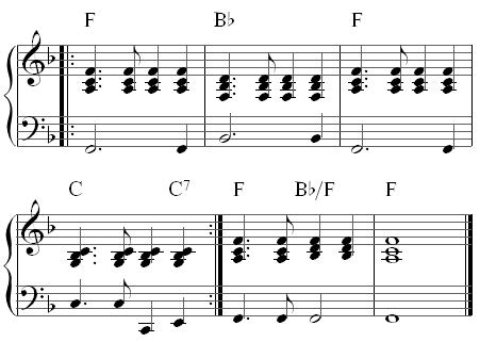


Primary Chords Chord Progressions I Iv V7 I Chords



Ii7 V7 I7 Progression



The Primary Triads In Minor Keys Music Theory Music Practice Theory Stack Exchange



Lesson 1 I Iv V7 I Progression In Major Keys At The Piano Youtube



Piano Chord Progressions I Iv V Iv Quick Tutorial Youtube



Learn Chord Progressions Popular Chord Progressions Enjoy Life Music



Mastering Essential Chord Progressions The I To Iv Relationship Jazzadvice
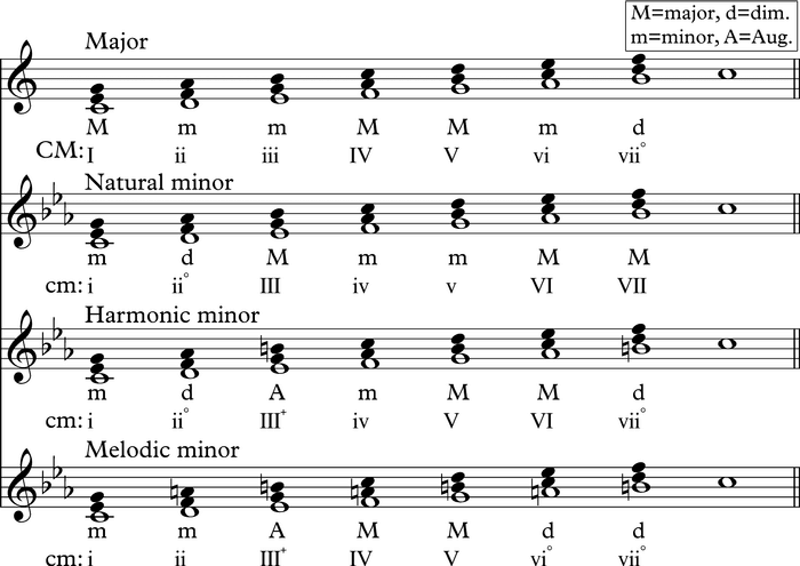


Minor Chord Progressions Write Deeply Emotional Music Musician On A Mission
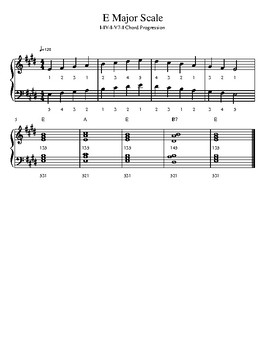


E Major Scale And Chord Progression I Iv I V7 I Worksheet Tpt



List Of Chord Progressions Wikipedia



How To Write A Chord Progression In 3 Levels Of Complexity The Hooktheory Blog



Video Lesson How To Unlock I Iv V Chord Progressions Acoustic Guitar
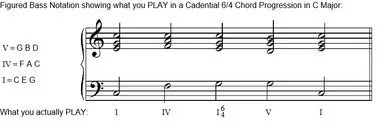


Cadential 6 4 Chord Progression Ultimate Music Theory



Gamecube Startup But Its In A I Iv V7 I Chord Progression Youtube



0 件のコメント:
コメントを投稿